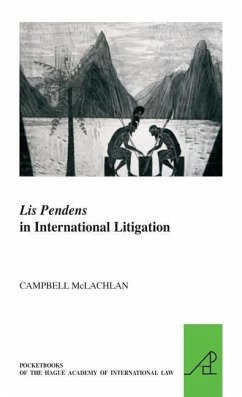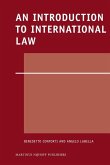What legal principles apply when courts in different jurisdictions are simultaneously seised with the same dispute ? This question - of international lis pendens - has long been controversial. But it has taken on new and urgent importance in our age. Globalization has driven an unprecedented rise in forum shopping between national courts and a proliferation of new international tribunals. Problems of litispendence have spawned some of the most dramatic litigation of modern times - from anti-suit injunction battles in commercial disputes, to the appeals of prisoners on death row to international human rights tribunals. The way we respond to this challenge has profound theoretical implications for the interaction of legal systems in today's pluralistic world. In this wide-ranging survey, McLachlan analyses the problems of parallel litigation - in private and public international law and international arbitration. He argues that we need to develop a more sophisticated set of rules of conflict of litigation, guided by a cosmopolitan conception of the rule of law.
Quels principes juridiques font foi lorsque des tribunaux de différentes juridictions sont saisis simultanément pour le même litige ? La problématique de la litispendance internationale a longtemps été controversée. Mais, de nos jours, elle devient de plus en plus importante. La mondialisation a entrainé une augmentation sans précédent de surenchères judiciaires entre les tribunaux nationaux, ainsi qu'une prolifération de nouveaux tribunaux internationaux. Les problèmes de litispendance ont engendré quelques uns des litiges les plus dramatiques des temps modernes, allant des batailles d'anti-suit injunction lors de litiges commerciaux aux appels des prisonniers dans le couloir de la mort devant les tribunaux internationaux des droits de l'Homme. La manière dont nous faisons face à ce défi a de grandes implications théoriques pour les interactions des systèmes judiciaires dans notre monde pluraliste. Dans cette étude de grande envergure, McLachlan analyse les problèmes de litiges parallèles au niveau du droit international privé et public, ainsi que l'arbitrage international. Selon lui, nous devons concevoir de nouvelles règles plus sophistiquées concernant les conflits de litiges, tout en respectant une conception cosmopolite de l'Etat de droit.
Quels principes juridiques font foi lorsque des tribunaux de différentes juridictions sont saisis simultanément pour le même litige ? La problématique de la litispendance internationale a longtemps été controversée. Mais, de nos jours, elle devient de plus en plus importante. La mondialisation a entrainé une augmentation sans précédent de surenchères judiciaires entre les tribunaux nationaux, ainsi qu'une prolifération de nouveaux tribunaux internationaux. Les problèmes de litispendance ont engendré quelques uns des litiges les plus dramatiques des temps modernes, allant des batailles d'anti-suit injunction lors de litiges commerciaux aux appels des prisonniers dans le couloir de la mort devant les tribunaux internationaux des droits de l'Homme. La manière dont nous faisons face à ce défi a de grandes implications théoriques pour les interactions des systèmes judiciaires dans notre monde pluraliste. Dans cette étude de grande envergure, McLachlan analyse les problèmes de litiges parallèles au niveau du droit international privé et public, ainsi que l'arbitrage international. Selon lui, nous devons concevoir de nouvelles règles plus sophistiquées concernant les conflits de litiges, tout en respectant une conception cosmopolite de l'Etat de droit.
"[T]he breadth of research in which Professor McLachlan has engaged across three separate legal disciplines ... [and] the author's practical experience at the 'sharp end' of litigation covering these disciplines pervades the book....The book is recommended to academics and legislators working in the relevant fields." - Adam Rushworth, Law Quarterly Review (January 2011)
"The virtue of this book is that it tackles the big problems head-on.... It also provides the simple pleasure of reading a crisp and illuminating account by a master of our trade of the state of the art in perhaps the most interesting legal topic of our time: the international scene." - Baragwanath J [2009] NZLJ 365
"The virtue of this book is that it tackles the big problems head-on.... It also provides the simple pleasure of reading a crisp and illuminating account by a master of our trade of the state of the art in perhaps the most interesting legal topic of our time: the international scene." - Baragwanath J [2009] NZLJ 365








